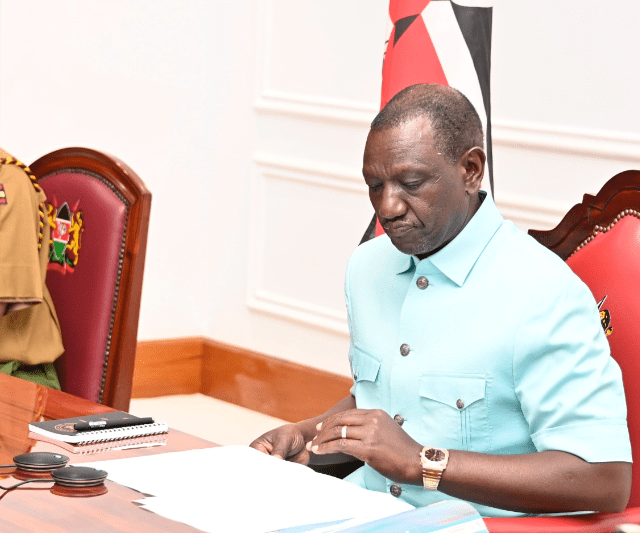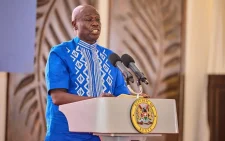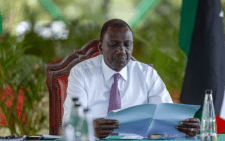LSK castigates Finance Bill 2024 for introducing additional tax burdens on lower-income Kenyans

The Law Society of Kenya (LSK) has expressed reservations against the Finance Bill 2024 for introducing additional tax burdens on lower-income Kenyans.
In a statement on Wednesday, June 12, 2024, LSK President Faith Odhiambo said the burdens will impact Kenyans' means of livelihood and quality of life, terming it an antithesis to the national goals and objectives.
"The Finance Bill 2024 aims to expand the tax base and increase revenue collection from Kenyan citizens. However, the law Society of Kenya is concerned about the potential implications of higher taxes and their impact of the regression in national equality. Introducing additional tax burdens on lower-income Kenyans. who already struggle with the high cost of living, directly impacts their means of livelihood and quality of life. This in itself Is an antithesis to the national goals and objectives," Odhiambo says.
Odhiambo has suggested key amendments to be introduced on the bill before it is passed, focusing on tax certainty, cost of living, and the rule of law.
"We have noted with significant concern the numerous proposals outlined in the Bill, which appear to reverse or diminish the various exemptions and benefits that were previously established by the Finance Act of 2023. If implemented, these proposals could potentially undermine the legislative gains achieved with the Finance Act of 2023. This would, in turn, adversely affect the many stakeholders who have benefited from these provisions," she stated.
"Importantly, tax certainty is a key tenet of tax systems and the continual addition and removal of provisions effectively erodes this certainty, ultimately undermining investor confidence. The stability and predictability that investors and businesses rely on to make long-term decisions is compromised by certain provisions in the Bill."
The Bill proposes to increase the excise duty rates applicable to telephone and Internet data services, as well as money transfer services, from 15 per cent to 20 per cent. The Finance Act 2023 had previously reduced the excise duty on telephone and internet data services from 20 per cent to 15 per cent.
The Bill has proposed to increase the rate of the import declaration fee (IDF) to three per cent from the current rate of 2.5% of the customs value of goods imported into the country. The current rate of three per cent had been reduced by the Finance Act 2023 from a rate of 3.5 per cent.
Odhiambo also laments that the Bill has proposed the removal of various exemptions that have been put in place by the Finance Act 2023 in relation to electric vehicles, motorcycles, buses and bicycles which had been put place by the Finance Act 2023.
"While these examples are just a few of the various clawback provisions proposed in the Bill, the LSK wants to emphasize the necessity of maintaining a stable tax regime in Kenya. Such stability is crucial for fostering an environment conducive to business operations and attracting foreign direct investment. We hope that the Departmental Committee on National Planning and Finance (DCNPF) will consider all the proposals submitted by stakeholders to create tax certainty," Odhiambo added.
LSK has also taken issue with the proposal to standard-rate bread, which it says will increase its cost.
"Given that bread is an essential good with few reasonable substitutes, we believe this will raise the cost of living for many Kenyans. Furthermore. due to the regressive nature of this proposal and the higher dependency on bread by lower-income households, this change will disproportionately affect those with lower incomes," the LSK president added.
LSK on motor vehicle circulation tax
Odhiambo has also faulted the government for proposing a motor vehicle tax at the rate of 2.5 per cent of the value of the motor vehicle.
LSK says the likely negative impacts include an increase in the costs of insuring vehicles and a reduction in motor vehicle insurance uptake.
Odhiambo says the tax will have a negative impact on the transport and logistics industry, leading them to pass on the additional cost to their customers, thus escalating the cost of living through a multiplier effect.
"Notably, vehicles are no longer luxuries, so an annual motor vehicle tax would place a disproportionate burden on lower-income households, especially those that rely on motor vehicles for their living. The motor vehicle tax will also lead to an increase in the operating costs of manufacturers and their suppliers who utilize vehicles for commercial and agricultural purposes. These additional operational costs will make businesses less profitable and will result in higher prices for consumers," the LSK boss explains.
LSK has also faulted the introduction of eco-levy on certain goods and products listed in the Fourth Schedule of the Miscellaneous Fees and Levies Act, including office machines, calculating machines, telephone sets (including smartphones), essential packaging plastics, rubber tyres, and diapers.
Also, the lawyers' body says empowering the Commissioner to automatically disallow a taxpayer's objection if the taxpayer fails to provide the requested information within a specified period is out of order.
"This proposed amendment grants excessive power to the Commissioner, potentially leading to unfairness and hindering access to a fair hearing for taxpayers. Additionally, it removes the taxpayer's right to appeal to the Tribunal if the Commissioner decides to disallow the taxpayer's objection, given that the provision in its current drafting does not require issuing a formal decision, leaving taxpayers with no recourse for appeal," LSK adds.
"Further, we have taken note of the proposed removal of the prohibition on the Commissioner from issuing agency notices when a taxpayer appeals to the Tax Appeals Tribunal or High Court, which raises significant concerns about the rule of law. If enacted, this proposal would allow the Commissioner to enforce tax collection of disputed taxes through agency notices even when a taxpayer has appealed against the tax in dispute."
LSK has also fingered the proposed unlimited access to personal data by the Kenya Revenue Authority (KRA) as a major concern on rights to priacy and data misuse.
"We take note of the proposal to exempt the processing of personal data by the KRA from the provisions of the Data Protection Act 2019, where the disclosure is necessary for the assessment, enforcement, or collection of any tax or duty under a written law. In our view, the proposed unlimited access to personal data, without court orders or proper procedures, will infringe upon taxpayers' rights to privacy and poses a risk of data misuse. For this reason, we consider such a move unconstitutional and a violation of the rule of law," Odhiambo said.
For these and more credible stories, join our revamped Telegram and WhatsApp channels.
Telegram: https://t.me/peopledailydigital
WhatsApp: https://whatsapp.com/channel/0029Va698juDOQIToHyu1p2z







